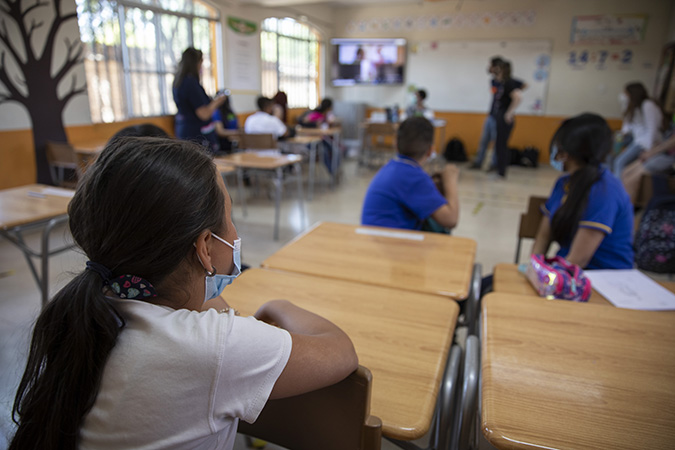Educational paradigm shift: School evaluation?
May 10, 2022

Eliminate the consequences, move towards a quality follow-up and evaluate for learning, were part of the ideas that were discussed in the panel held at the inauguration of the Postgraduate academic year. The Minister of Education, the dean of the UC School of Education and the heads of the Master's and Doctoral programs of the unit participated.
How do we evaluate schools? This was part of the questions that arose in the conversation panel held within the framework of the inauguration of the postgraduate academic year of the Faculty of Education of the Catholic University. The Chilean Minister of Education, Marco Antonio Ávila, the dean of the faculty, Alejandro Carrasco, the head of the Program PhD in Education, Valeria Cabello, and the head of the Magister in Education, Veronica Santelices.
"We must have an evaluation system that allows us to guide the system and make decisions, but it has to be reviewed," said the Minister of Education, Marco Antonio Avila, responding to a question about the idea of reformulating the National Quality Assurance System and, more specifically, the Simce test which, for many, puts pressure on teachers and encourages competition between schools. Theme that he touched on in his magisterial talk entitled 'Towards the educational paradigm shift'.
On the occasion, the holder of the portfolio clarified that “I have never said that we must eliminate Simce, but this cannot be a condition for a school to close. Is it census or sample? Let's talk about it. It is very strange that the state closes its schools.”
"That implies redrawing and that is the conversation that we believe must be done," added the authority on the panel. “And clearly the most important thing is to eliminate the consequences and add to this a significant support process that will allow us to show in three or four years that the school is advancing in relation to itself and not in comparison, much less in a ranking”.
In this sense, the head of the Master of Education UC, Veronica Santelices, proposed that large-scale evaluations “be a path with two directions (supervision and guidance) and that they are not discerned, that classroom evaluation make sense. That it makes sense because it will contribute to the students on a day-to-day basis, but that requires that it be validated by the school communities and that it be more transparent in its design, and with greater communication between those teams and the schools”. In the words of Dean Alejandro Carrasco, "we must move towards an evaluation for learning and not learning."
For her part, the head of the PhD in Education UC, Valeria Cabello, He pointed out that "if I could make one change, it would be to move towards a quality monitoring system", pointing to greater inclusion in education and continuous support from educational establishments.
"That indeed we could evaluate to improve depending on the schools and not in a system that is thought more from a market logic, or beyond a logic that works by sanctioning those who do not reach a certain standard, but instead accompanying those who have greater difficulties in reaching those standards”, added the academic.
